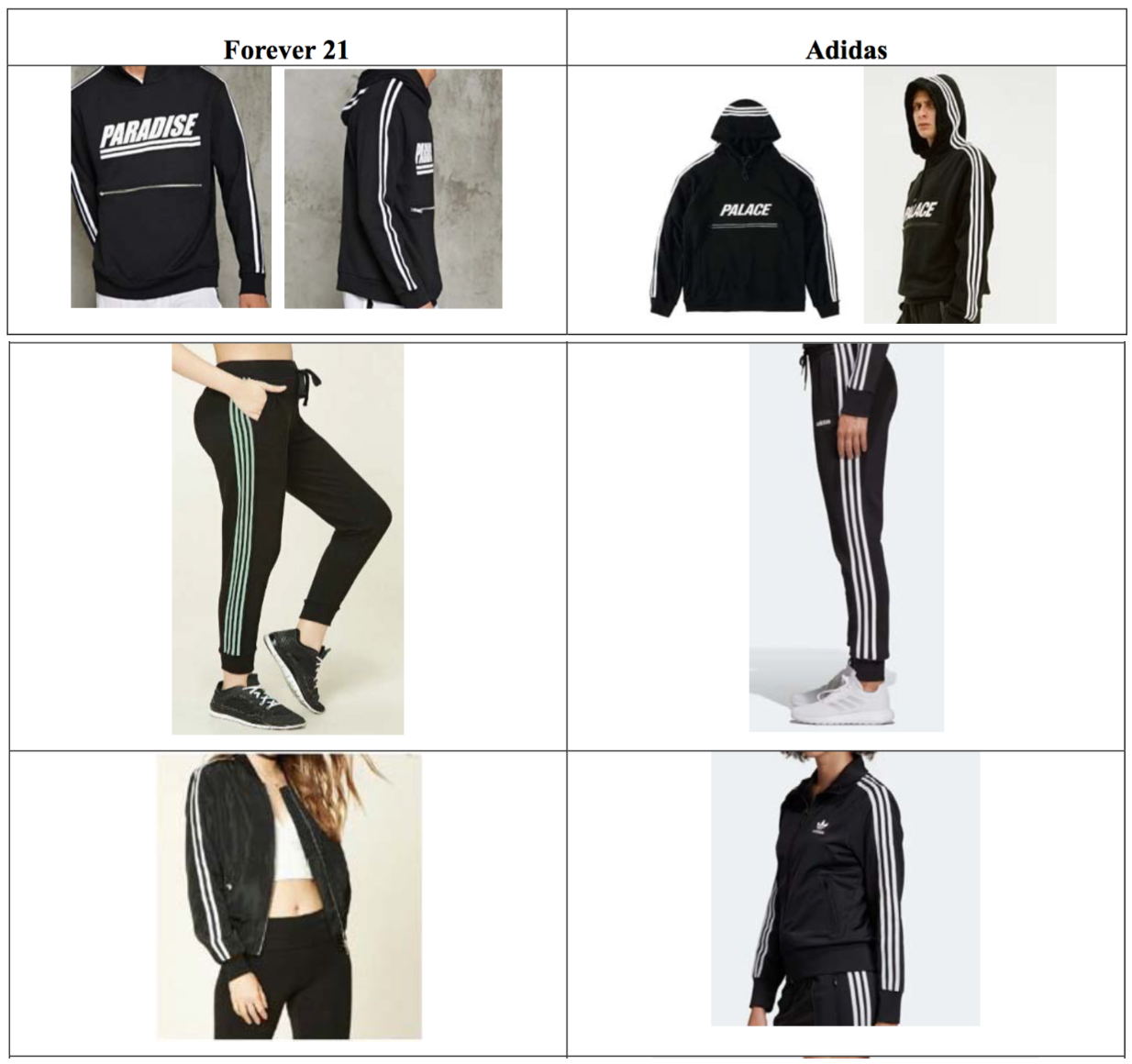Over two years after adidas sued Forever 21 for selling garments and accessories bearing allegedly infringing striped designs in violation of two of the parties’ prior settlement agreements, and for offering up “repurposed adidas” products on its website, which adidas alleged are counterfeits, the German sportswear giant wants the court to dismiss a handful of Forever 21’s response claims, including the fast fashion retailer’s attempt to invalidate one of adidas’s trademark registrations.
“This case is about a famous trademark, namely, adidas’s Three-Stripe Mark, and Forever 21’s repeated infringement of that mark,” as enabled by its suppliers, who are also listed as defendants, “despite Forever 21’s repeated contractual promises to respect adidas’s trademark rights,” counsel for adidas asserts in a redacted motion for partial summary judgment filed this week in a federal court in Oregon as first reported by WWD.
In an attempt to “avoid its obligations under the parties’ prior settlement agreements and excuse its blatant and continuing disregard of adidas’s rights, Forever 21 asserts a baseless counterclaim” and “raise a host of baseless defenses,” which adidas wants tossed out.
Primarily, adidas takes issue with Forever 21’s counterclaim, in which the ailing Los Angeles-based retailer asserts that at least one of adidas’ three-stripe trademarks – one that consists of three diagonal lines positioned parallel to each other against a contrasting background – is invalid (and thus, the corresponding trademark registration should be cancelled) because it is merely decorative and not an indicator of source as required for trademark rights and protection.
Adidas asserts that not only “does [it] not use stripes merely as a design element,” its three-stripe trademark – which it has used since as early as 1952 – is “a source identifier that adidas has carefully cultivated through its investment of hundreds of millions of dollars in advertising and promotions, including its sponsorships of athletes, sports teams, musical artists, and fashion designers.” Those efforts, adidas argues, “undoubtedly have paid off, in terms of both brand recognition and sales of products bearing the three-stripe mark.” For instance, adidas argues that it is “ranked as one of the world’s most valuable brands, and a 2016 study found that 99% of consumers are aware of the adidas brand.”

And even if the three-stripe mark were being used ornamentally, “which it is not,” per adidas, it, nonetheless, serves as “a strong and famous source indicator” that identifies and distinguishes adidas’ products from others, and thus, warrants protection, as “an ornamental mark is protectable if it serves a source-identifying function.”
While adidas’ counsel claims that it does not need to establish that the three-stripe mark enjoys secondary meaning (because the three-stripe mark is “arbitrary and thus, inherently distinctive,” thereby, removing the need to prove that it has established distinctiveness in the minds of consumers … or secondary meaning), if the brand needed to, “there is little question that it would be able to” show that “the general purchasing public of the U.S. associates the three-stripe mark exclusively with adidas.”
For instance, adidas states that its “extensive promotion of its three-stripe mark has resulted in hundreds of millions of dollars of annual sales within the U.S.,” and has been the subject of “numerous unsolicited media references,” which, taken together, “unquestionably demonstrates that the three-stripe mark has achieved secondary meaning.”
More than that, though, “This court repeatedly has found and, indeed, a jury has likewise conclusively determined … [that adidas’ three-stripe mark] is a strong and famous trademark,” adidas asserts, and with that in mind, argues that Forever 21’s claims to the contrary should be put to bed.
Turning its attention to prior settlement agreements between itself and Forever 21, including one of a redacted date, followed by another in 2015, adidas claims that Forever 21 agreed that it would “not produce, manufacture, distribute, sell, offer for sale, advertise, promote, license, or market . . . any . . . product bearing the three -stripe mark or any design, mark, or feature that is confusingly similar to the three-stripe mark.”
The parties’ 2015 settlement agreement did not last long, according to adidas, as “less than eighteen months [after its] execution, adidas discovered even more Forever 21 products that violated [its] rights in its three-stripe mark,” which is what prompted adidas to file the suit at hand for trademark infringement and dilution, unfair competition, and unfair and deceptive trade practices. Still yet, adidas claims that during the course of this litigation, it has “discovered additional unlawful products being sold by Forever 21,” and in total, has identified fifty-two separate Forever 21 styles that infringe and/or dilute its rights in the three-stripe mark – from dresses and bomber jackets to sports bras and hoodies.
Adidas goes on to take issue with additional defenses set forth by the defendants, including Forever 21’s claim that its sale of “repurposed adidas” products is protected by the first-sale doctrine, to which adidas argues that “the first-sale doctrine does not apply when the reseller is not selling the genuine product,” and asks the court to enter summary judgment in its favor.
UPDATE (October 4, 2019): On the heels of Forever 21 filing for bankruptcy in September, the fast fashion giant filed a motion to stay adidas’ case for the duration of the bankruptcy proceedings. On October 4, a Portland federal court judge confirmed the automatic stay, issuing an order to pause the case, so to speak, “without prejudice to the parties’ ability to request that the court lift the stay and reopen this action as appropriate.”
In a decision on Friday, Magistrate Judge Youlee Yim You held that “all case deadlines are terminated,” ordering the parties to “file a status report by 4/3/2020 and every 180 days thereafter, and advise the court promptly when the bankruptcy matter is resolved.”
* The case is Adidas America, Inc. et al v. Forever 21, Inc., 3:17-cv-00377 (D. Or.).











